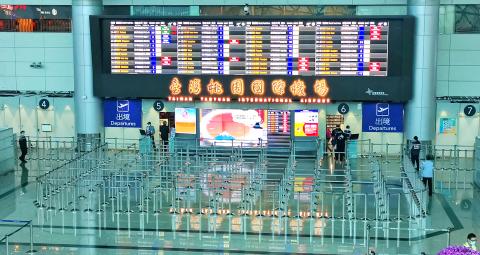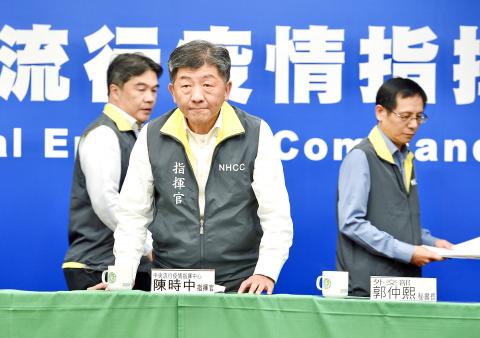The Central Epidemic Command Center (CECC) yesterday announced that Chinese minor children of Taiwanese and Chinese couples would continue to be banned from entering Taiwan.
At their regular weekly meeting yesterday, President Tsai Ing-wen (蔡英文) and Premier Su Tseng-chang (蘇貞昌) overturned a policy announced by the Mainland Affairs Council (MAC) on Tuesday that would have allowed the children entry under special conditions, the center said.
Facing a widespread outbreak of COVID-19 in China, the center announced a ban on the entry of Chinese visitors from Thursday last week, but the council initially relaxed the policy on Tuesday.

Photo: Tony Yao, Taipei Times
Minister of Health and Welfare Chen Shih-chung (陳時中), who heads the center, yesterday told a news conference in Taipei: “We are revoking all the control measures allowing Chinese minor children of Taiwanese and Chinese couples to return to Taiwan announced by the MAC on Tuesday.”
“Chinese children of Taiwanese and Chinese couples who do not have nationality of our country and are still in China, Hong Kong or Macau will not be allowed to enter Taiwan,” he said.
The MAC had announced that the exception would allow Chinese minor children of Taiwanese and Chinese couples who have an Alien Resident Certificate or a long-term visa for visiting family or relatives to enter Taiwan, but they would be placed in home quarantine for 14 days after arrival.

Photo: Peter Lo, Taipei Times
The announcement quickly sparked public confusion and criticism, with the MAC on Tuesday night saying that the policy had been narrowed to only include Chinese children who are under 18 years old, “have been living in Taiwan” and “have no one to take care of them in China,” adding that they must apply for entry and gain approval from the National Immigration Agency.
Chen yesterday said that anyone who is in Taiwan would receive equal medical treatment if they are infected, and anyone who is in home isolation or home quarantine in Taiwan would also be regulated equally.
“However, there must be a differentiation at border controls and priority is given to Taiwanese,” he said.
Many Taiwanese in China are likely to return for the Tomb Sweeping Day holiday, so the center is worried that loosening border controls would cause a capacity shortage, he added.
About 5,000 people are placed in home quarantine every day and as quarantines last 14 days, there would be more than 70,000 people in home quarantine every day and more people are needed to monitor them, Chen said.
COVID-19 testing capacity has increased to about 1,010 people per day, but two test results are required to confirm each case and about 40 percent of the nation’s 1,100 negative pressure isolation rooms are being used, so some capacity must be reserved for possible emergency situations, he said.
“We know there is kinship between Chinese minor children and their Taiwanese parents, but our principle is to put Taiwanese first,” Chen said. “There are already many problems to deal with among Taiwanese, such as those who are ill, but stranded in Wuhan [the epicenter of the outbreak in China]… Emergency rescue operations could be needed at any time.”
“We will not allow our medical and related capacity to be used on non-Taiwanese. Of course, we hope to help others if we have spare capacity, but the CECC will have failed in its duty if we cannot act within our power,” he said.
Chinese minor children of Taiwanese and Chinese couples could not have been left alone in China without caregivers, as their parents must have made arrangement for them before returning to Taiwan, Chen said.
“Moreover, they [parents] had the option to choose their nationality in the first place, but they did not choose Taiwan, so they must make proper arrangements for themselves and bear the consequences now,” he said.

MAKING WAVES: China’s maritime militia could become a nontraditional threat in war, clogging up shipping lanes to prevent US or Japanese intervention, a report said About 1,900 Chinese ships flying flags of convenience and fishing vessels that participated in China’s military exercises around Taiwan last month and in January last year have been listed for monitoring, Coast Guard Administration (CGA) Deputy Director-General Hsieh Ching-chin (謝慶欽) said yesterday. Following amendments to the Commercial Port Act (商港法) and the Law of Ships (船舶法) last month, the CGA can designate possible berthing areas or deny ports of call for vessels suspected of loitering around areas where undersea cables can be accessed, Oceans Affairs Council Minister Kuan Bi-ling (管碧玲) said. The list of suspected ships, originally 300, had risen to about

DAREDEVIL: Honnold said it had always been a dream of his to climb Taipei 101, while a Netflix producer said the skyscraper was ‘a real icon of this country’ US climber Alex Honnold yesterday took on Taiwan’s tallest building, becoming the first person to scale Taipei 101 without a rope, harness or safety net. Hundreds of spectators gathered at the base of the 101-story skyscraper to watch Honnold, 40, embark on his daredevil feat, which was also broadcast live on Netflix. Dressed in a red T-shirt and yellow custom-made climbing shoes, Honnold swiftly moved up the southeast face of the glass and steel building. At one point, he stepped onto a platform midway up to wave down at fans and onlookers who were taking photos. People watching from inside

Japan’s strategic alliance with the US would collapse if Tokyo were to turn away from a conflict in Taiwan, Japanese Prime Minister Sanae Takaichi said yesterday, but distanced herself from previous comments that suggested a possible military response in such an event. Takaichi expressed her latest views on a nationally broadcast TV program late on Monday, where an opposition party leader criticized her for igniting tensions with China with the earlier remarks. Ties between Japan and China have sunk to the worst level in years after Takaichi said in November that a hypothetical Chinese attack on Taiwan could bring about a Japanese

The WHO ignored early COVID-19 warnings from Taiwan, US Deputy Secretary of Health and Human Services Jim O’Neill said on Friday, as part of justification for Washington withdrawing from the global health body. US Secretary of State Marco Rubio on Thursday said that the US was pulling out of the UN agency, as it failed to fulfill its responsibilities during the COVID-19 pandemic. The WHO “ignored early COVID warnings from Taiwan in 2019 by pretending Taiwan did not exist, O’Neill wrote on X on Friday, Taiwan time. “It ignored rigorous science and promoted lockdowns.” The US will “continue international coordination on infectious